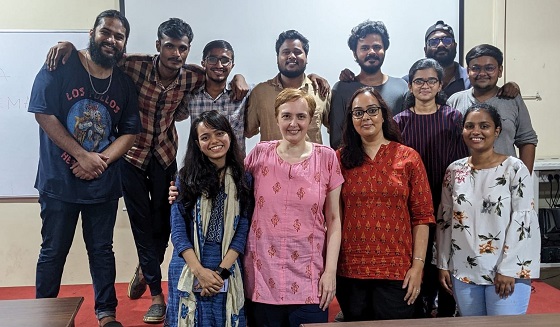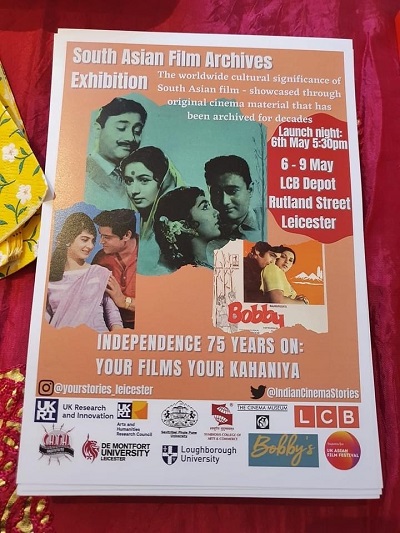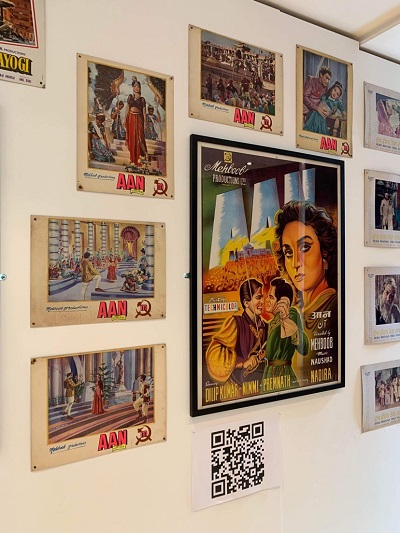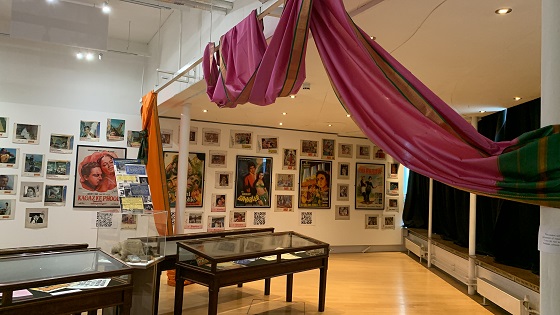A year-long De Montfort University Leicester (DMU) study into people’s perceptions of Indian film during the 75th anniversary of the country’s independence has been transformed into a digital gallery.
Dr Monia Acciari, a DMU Associate Professor in Film History, who specialises in Indian cinema and archives, says the new digital exhibition space will ensure the personal stories she captured, in both India and Leicester, continue to be seen and heard.

Dr Monia Acciari & Dr Anoop Bhopal Nair (front centre) with students during her research
Dr Acciari also hopes that the extensive online exhibition, consisting of video, written contributions and memorabilia, such as photos and film posters, will lead to new histories being created by those who pay a virtual visit.
Part of the exhibits were collected during 2022 as part of a UK-India joint initiative , to celebrate collaborations in cultural heritage and the creative industries, and has thrown new light on how both the indigenous population and the 2nd and 3rd generation diaspora in Leicester value heritage.
Dr Acciari, with the support of fellow DMU researchers Dr Anoop Bhogal-Nair and Dr Antonia Liguori from Loughborough University, spent four months in India working with students from partner institutions in the city of Pune.
They spoke to students at The University of Pune and the Symbiosis College of Art and Commerce, about archives, creative approaches to film history, historical commemorations such as Indian independence and the power of digital storytelling.
RELATED NEWS
You can tour the exhibition and watch and read the digital archives here
Exhibition that explored Indian film archives
Find your new home. Come to our next DMU Open Day
Dr Acciari said: “I had many chance encounters in India and the UK with people who shared some incredibly personal stories and had personal collections of memorabilia to go with them.
“The project became so much more than a look at the impact of independence and people’s understandings of these events.

“It helped me understand how unique film heritage is for a country like India, transcending institutional archives.
“Archives up until now did not do justice to the richness of stories that are intrinsically embedded in the story of cinema and the story of independence. We want to make tis research available to everyone.”
Dr Acciari and Dr Bhogal-Nair noticed that there were distinct differences between people in India and the diaspora in Leicester when it came to talking about independence and their relationship with cinema.

Dr Acciari said: “Cinema is a huge aspect of community and togetherness as well as escapism for people in India and the diaspora. Cinema-going is a significant aspect of life for the Indian population, and Indian film memorabilia offers ways to reimagine part of a lost and silenced history.
“If you showed an Amitabh Bachchan image to people in India and the diaspora, you would have a significant response , because of his importance in the industry and in the life of many fans.
“Similarly, everyone in India and outside India is engaged with the 75th anniversary of Indian independence, but in a diverse way.
“When you talk about independence while in India the experiences and, to some extent, the pain of what happened still runs quite deep.
“Even among the younger generations there are still tangible consequences of independence. It is ingrained into the society.
“In the UK the discomfort about that period of history is less pronounced and the sense of belonging is very different.
“The effect of independence is not something that endures in the community or the society they live in. Independence and its consequences are still very much part of a shared history within the diaspora in the UK but they possible have a more distant view of it.”

Dr Monia Acciari and Dr Anoop Bhogal Nair held conversations with the public to capture their experiences. Archival material used in public engagement and in training sessions in India, were used to collect stories using the method of ‘Digital Storytelling’.
Dr Acciari says digital storytelling is ‘a democratic approach that enables the citizen to create a story to share with us, where memorabilia acts as a trigger to enable such stories.
‘The power of digital storytelling was used to capture intimate moments with film history and Independence and enable unique stories to emerge.
‘The collection of research in a digital space gives voice to untold stories.”
Posted on Friday 3 March 2023